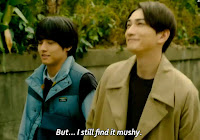I read somewhere that Henry VI was Shakespeare's idea of a truly virtuous king.
I'm not sure Shakespeare would agree. The Hollow Crown portrays him as sweet-natured and sincere but troublingly naive. He tries to bring his magnates together but doesn't understand the underlying politics and isn't tough or honest enough to take a position that could result in violence since he would then have to defend that decision. Dante would have stuck Henry VI in a circle of hell that punishes those who undermine or ignore the need for social order.
Henry VI is married to Margaret of Anjou, who was chosen for him by her lover. Towards her, Henry VI is bashful and romantic while she is...
Bored by him.
As a romantic, I could wish that like a tough Christie heroine, Margaret would be happy to marry a sweet guy who won't challenge her but rather give her safe harbor and scope to do as she wishes.
But she isn't, and she isn't happy in a very believable way. She is tough, clever, manipulative, a chess player (the queen figure that moves!). She is derisive of Henry and can't shed her derision. She is such a strong character that some critics think that Shakespeare really wrote the plays (Henry VI, Parts 1 and 2) about her. Hey, he even brought her back in Richard III! And the critics have a point. In The Hollow Crown, which is fairly faithful to the plays, Margaret starts out out-maneuvering various ladies at court. The politics are as petty as all politics; they are also a fight over who will control Henry and therefore, the throne. She eventually burns down a guy's house and slaughters him.
I'd never seen a production of
Henry VI, in part
because I thought it was about a sweet king being manipulated by evil advisors and...okay, it
is a play about a sweet king being manipulated by evil advisors (
The Hollow Crown is also incredibly violent,
showing what Shakespeare has characters describe; I skipped through the last hour or so). But the play is about more than sweetness and evil. Everyone, including Margaret, has legitimate grounds for their particular agenda: a wish to survive, too-long memories and grudges as well as past reason to distrust and fear, lack of better options, loyalty. Advisors play off against each other, creating distractions from more important issues. And many of them behave as decently as they can in the moment.
Shakespeare understood human behavior, including the wretchedness of political behavior (it's rather astonishing that more of his plays weren't banned by the powers-that-be but he was clever enough to use the past for his criticisms and to cloak his plots in apparent symbolism about something else).
Shakespeare's realism here is why I'm not a big fan of royalty romances--contending with real-life politics is demoralizing. Bonding with a royal can in fact be dangerous--to health, rationality, emotional stability, and one's actual life. In real life, Henry VI and Margaret got along okay since they shared interests in intellectual pursuits and art. I still suspect--William and Kate aside--that these royal relationships are inherently kind of awful.
 |
| Powerhouse! |
















